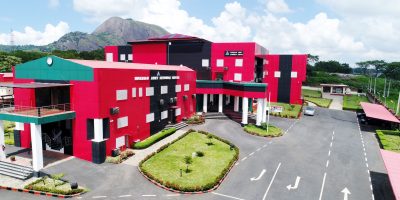Nigerian Army Resource Centre (NARC) Weekly Subject Experts’ Presentation was held at Hall E, ML Agwai Block, Abuja. There were three presentations made by the Subject Experts on China, Middle East, North Africa and Turkey and South America and the Carribean.
The first presentation by Maj Gen JA Orokpo (Rtd) subject experts on China, Centered his presentation on how China’s Spy Ministry Raises Alert Over Foreign Non-Governmental Organizations theft of Environmental Data. The South China Morning Post (SCMP) reported on 13 May 24 that China’s top spy agency sounded an alarm about foreign Non-Governmental Organisations (NGO) and organisations, saying that 2 organisations had stolen ‘environmental data’ from China under the guise of research and environmental protection. The allegations were outlined in an article posted on the Ministry of State Security’s public WeChat account, and referred to 2 cases of theft of “geographical, meteorological, biological and other sensitive data from China’s important nature reserves, posing risks and hazards to national security”.
In his analysis and lessons for Nigeria, Maj Gen JA Orokpo (Rtd) noted that, In Nigeria, it has been reported that NGO’s have been involved in some unwholesome practices. The Vanguard Newspaper of 24 Feb 24 reported that the Nasarawa State Government had expressed concern over the sharp and unwholesome practices of NGO’s in the State. On 20 Sep 19, the Punch Newspapers reported that the “Nigerian Army has sealed the office of an NGO in the North East over alleged support of Boko Haram”. It further stated that ‘the subversive action of the NGO, Action against Hunger, persisted despite several warnings to desist from aiding and abetting their activities.
He recommended that, the FGN should implement stringent monitoring mechanism to oversee the activities of the foreign NGO’s, ensuring compliance with regulations and ethical standards and also Enforce transparency requirements for the NGO’s in order to prevent illicit funding and activities that undermine national security
Equally the second presentation by Brig Gen SA Gumel Subject experts on South America and the Carribean focused his presentation on how Argentina Sees Notable Decline in Country Risk. By the end of first Quarter 2024, Argentina’s financial and economic condition showed signs of improvement, with its country risk falling to 1,302 basis points. This was its best performance since September 2020, when the figure briefly dipped to 1,101 points. This improvement came shortly after Argentina restructured its debt and the JP Morgan adjusted its index to include new Argentine bonds. Under the leadership of President Javier Milei, however, Argentina’s bonds have surged, right after its debt was restructured. Economic crisis of a country is usually associated with sudden downturn in aggregate output or real Gross Domestic Product (GDP). The result of which is simply a decline in real income per capital and increase in unemployment and poverty.
In his analysis and lessons for Nigeria, Brig Gen SA Gumel pointed that, Nigeria has recently experienced a notable decline in country risk, marking a significant shift in its economic and political landscape. This decline can be attributed to several key factors. Nigeria has undertaken substantial efforts to diversify its economy away from its heavy reliance on oil exports. By investing in sectors such as agriculture, manufacturing, and knowledge- based services economy, Nigeria has reduced its vulnerability to fluctuations in global oil prices, which previously posed significant economic risks.
He recommended that, the Federal Government of Nigeria should To prioritize investments in local industries/production as well as ways/means for easy access to credits and microloans that will help reduce dependence on imports for businesses to thrives and also should, in its economic diversification efforts, explore and pursue a Knowledge-Based Services Economy in addition to agriculture and mining sectors.
While the third presentation by Brig Gen SO Oloyede Subject experts on Middle East, North Africa and Turkey, focused his presentation on how US Destroys Four houthi Drones in Gaza. Arab News (2024) reported on Thursday 16 May 2024 that the US Central Command (CENTCOM) forces had destroyed four drones in an area controlled by the Houthi militia in Yemen. Thus, thwarting a crime on ships in international commercial waterways. According to the report, CENTCOM affirmed that these actions were taken to protect freedom of navigation and make international waters safer and more secure for US, coalition and merchant vessels (Kuwait News Agency, 2024).
In his analysis and lessons for Nigeria, Brig Gen SO Oloyede stressed that, Since the Islamic revolution of 1979, Iran has promoted Khomeinism as one of its foreign policy tools in the Muslim world.China, Russia, US, EU, Israel, Egypt and other Arab Gulf states, among others designated Muslim Brotherhood, Al Nusra, and other Al Qaeda affiliates as terrorist groups, which enjoy mass material support from Iran (Lin, 2015).Others include Hamas, Hezbollah and Houthis in Palestine, Lebanon and Yemen respectively. The US has been Nigeria’s biggest supporter in terms of military support in the last decade till date. Nigeria could strengthen its military and economic cooperation with the US, to get rid of terrorism in all forms by conceding to US’ request to make Nigeria AFRICOM Headquarters. This could rapidly enhance and facilitate America’s defence and protection of its national interest in Nigeria and by extension, Nigeria’s national interest, with regard to counterterrorism.
He recommended that, the Federal Government of Nigeria should ensure successful implementation of National Development Plan (2021-2025), UN Sustainable Development Goals and President Tinubu’s Eight Point Agenda and also National Orientation Agency in conjunction with Federal Ministry of Information should educate the masses about the dangers of religious intolerance.






























